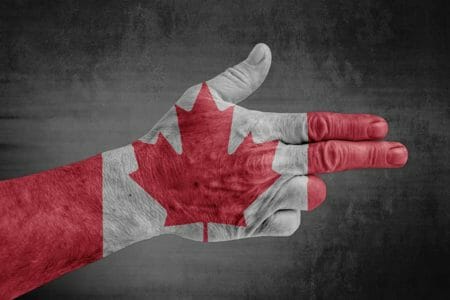Hat tip to Greg Bishop of Bishop On Air for his excellent real-time coverage of these proceedings.

East St. Louis, IL — The federal trial challenging Illinois’ gun and magazine ban took a poignant turn as U.S. District Judge Stephen McGlynn reflected on the tragic history of racial violence, questioning how events like the 1917 East St. Louis race riots and the 1921 Tulsa massacre might have unfolded differently if Black victims had access to the types of firearms now banned under the state’s Protect Illinois Communities Act.
The law, enacted in January 2023, prohibits the sale and possession of over 170 types of semi-automatic firearms and high-capacity magazines. Plaintiffs argue that the law is unconstitutional and violates the Second Amendment, while the state maintains that these weapons are “dangerous and unusual” and not suited for civilian use. Thursday marked the fourth and final day of the bench trial in the Southern District of Illinois federal courtroom.
During closing statements, Judge McGlynn invoked the 1917 East St. Louis race riots, where more than 30 Black individuals were killed, and numerous homes and structures were burned. He urged the courtroom to visit the “sacred sites” in the city, reminding everyone that this location holds a deep connection to America’s history of racial violence. McGlynn shared a photo showing the current courthouse surrounded by charred ruins from the 1917 riots and posed a compelling question: “How would that have been different if the Black victims had such firearms?”
Gun ban judge: What if Black victims of historic race riots had such weapons https://t.co/2W1SScp5bm via @thecentersquare
— Bishop On Air (@BishopOnAir) September 19, 2024
The judge’s reflections extended beyond East St. Louis, touching on the 1921 Tulsa race massacre, where a prosperous Black neighborhood was decimated by white mobs. McGlynn pondered whether access to firearms, like the ones currently banned, could have changed the outcome for those facing violent mobs. He also referenced a recent video showing an international gang in Aurora, Colorado, armed with high-powered rifles, asking, “What if those victims were on their own, hiding, without the ability to defend themselves?”
Plaintiffs’ attorney David Sigale echoed the judge’s sentiments, stating that such historical reflections are a core reason he is passionate about Second Amendment issues. “There’s countless stories of people victimized, whether it’s for race or their gender,” Sigale said outside the courthouse after the proceedings.
The defense closed its case by calling retired Lt. Col. Jason Dempsey as a witness. Dempsey acknowledged that semi-automatic fire is often favored in the military but emphasized that he prefers training and accountability over outright bans on such weapons. Despite his military background, Dempsey admitted he was unfamiliar with the specific technical differences between civilian and military firearms, such as materials and treatments.
Sigale was quick to note that Dempsey’s personal views on training over bans were unlikely to sway Illinois lawmakers, stating, “It was certainly an interesting comment, and I’m sure Judge McGlynn will consider it in the mix.”
The defense argued that semi-automatic rifles, including the now-banned AR-15, are comparable to military firearms and that their regulation is justified. The plaintiffs, however, contend that these firearms are commonly used by civilians for lawful purposes like self-defense and should not be restricted.
Judge McGlynn’s decision is highly anticipated, with both parties given 30 days to submit additional briefs. A ruling, potentially including a permanent injunction, could follow shortly thereafter. This case not only holds significance for Illinois gun laws but could also set a precedent for similar legislation across the country.
As the trial concludes, the courtroom and broader Illinois community are left to reflect on the complex intersection of history, racial violence, and modern-day gun control laws. The judge’s invocation of the 1917 race riots provides a sobering reminder of the historical contexts in which these debates unfold, adding another layer of complexity to the ongoing battle over the Second Amendment and public safety.
Background: Illinois’ Protect Illinois Communities Act
The gun and magazine ban at the center of this trial was enacted following a series of high-profile mass shootings in Illinois and nationwide. The law prohibits the sale and possession of more than 170 types of semi-automatic firearms, as well as magazines with a capacity greater than 10 rounds for rifles and 15 rounds for handguns. Proponents argue that these measures are necessary to reduce gun violence, while opponents claim the law infringes on constitutional rights.
The Seventh Circuit U.S. Court of Appeals initially sided with the state, allowing the law to remain in effect while the case proceeds. Litigants on both sides now await Judge McGlynn’s final ruling, which could have far-reaching consequences.





We ALREADY know what would have happened. I believe it was Texas where Democrats tried to keep blacks from owning guns so the KKK could ride through and terrorize them at will. Then the Federal courts stepped in, the African Americans armed themselves, and the nonsense stopped.
My 1st grade neighbor understands this, why do our Demunist Americans deny it?
You all remember the term “Saturday Night Special,” don’t you!?! It comes from the anti gun term, “N*gger Town Saturday Special!”
once again, the racial history of Gun Control!
So the far leftist Illinois politicians think they can get around the 2nd amendment by making irrational and illogical claims that semi auto firearms are unusual and dangerous. Semi autos have been around since the 1890’s. What do they say about that? There were multi firing black powder rifles back in the early 1800′,s. How soon do you think it will be before these same far leftist politicians say that bolt action rifles and lever action rifles are unusual and dangerous.? And they are to be banned from law abiding American citizens? In commie- anada, their dictator said that they… Read more »
It would appear Plaintiffs missed the boat. they SHOULD have brought in expert witnesses to give factual details showing how different in reality and capability military weapons are when compared with civilian versions that only appear similar.
No military anywhere in the world uses what we must settle for in the US market for semiauto long guns.
The judge should educate himself and learn that the Tulsa riots were started by blacks with guns who went into a neighborhood full of white wives and started shooting
I get his point but…..
A very good read to follow up on U.S. District Judge Stephen McGlynn’s comments on the murderous riots of 100 years ago is “To Trust the People with Arms” by Prof. Robert J Cottrol of Law and History at George Washington University and Prof. Brannon P. Denning of Cumberland Law School at Stamford University. Their book is a deep dive into the US Supreme Court’s treatment of the Second Amendment since the founding of our Republic 240 years ago. They daylight how several States re-interpreted, dismissed, and basically gutted the Second Amendment of the Bill of Rights, as well as… Read more »